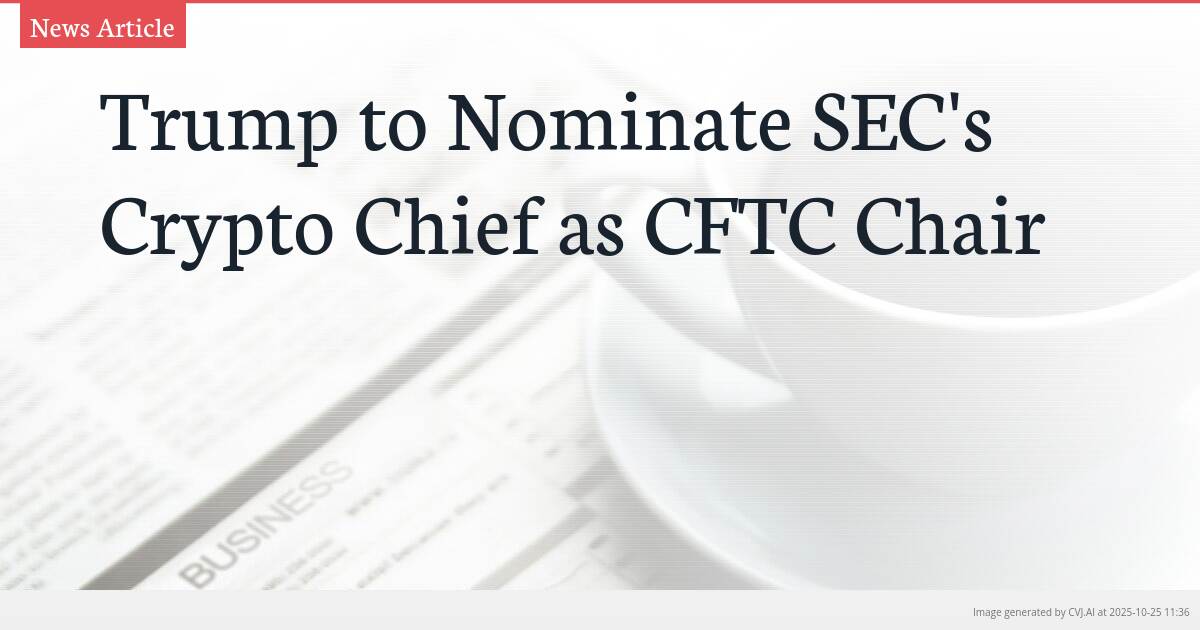This summary text is fully AI-generated and may therefore contain errors or be incomplete.
Introduction
President Donald Trump is reportedly preparing to nominate Michael Selig, the Securities and Exchange Commission’s crypto task force chief counsel, as the next chair of the Commodity Futures Trading Commission. This strategic move signals a major shift in the administration’s approach to digital asset oversight and represents a significant political victory for cryptocurrency advocates, particularly Gemini founders Tyler and Cameron Winklevoss. The nomination follows the White House’s withdrawal of Brian Quintenz’s earlier nomination after intensive lobbying efforts by industry stakeholders.
Key Points
- Michael Selig's nomination follows the withdrawal of Brian Quintenz, whose nomination was opposed by Gemini founders over regulatory concerns
- The appointment strengthens coordination between SEC and CFTC on crypto regulation as both agencies develop shared oversight frameworks
- The CFTC faces significant staffing challenges, operating with only one acting chair amid growing regulatory responsibilities for digital assets
A Strategic Shift in Financial Regulation
The reported nomination of Michael Selig to lead the Commodity Futures Trading Commission marks a pivotal moment in U.S. financial regulation. Selig has been a central figure behind the SEC’s ongoing pro-crypto overhaul during the Trump administration’s second term, making his elevation to the CFTC leadership particularly significant. This move follows the White House’s decision to withdraw the earlier nomination of Brian Quintenz, whose candidacy was stalled in July after the Winklevoss twins asked Trump to halt the process.
The appointment signals a stronger alignment between the SEC and CFTC, America’s two primary financial regulators, as both agencies prepare to build a shared regulatory framework for cryptocurrencies, tokenized assets, and prediction markets. This coordination comes at a critical juncture, with the CFTC facing one of the most transformative periods in its fifty-year history as it grapples with rapidly evolving crypto derivatives, decentralized finance, and tokenized commodities.
The Winklevoss Factor and Political Dynamics
The nomination represents a clear political victory for Gemini co-founders Tyler and Cameron Winklevoss, who have reportedly lobbied the administration extensively to replace Quintenz. The twins were openly critical of Quintenz’s stance on the CFTC’s 2022 lawsuit against Gemini and objected to his calls for expanding the agency’s budget to manage growing digital asset oversight. They argued that such expansion could lead to ‘regulatory capture,’ ultimately campaigning successfully for Quintenz’s withdrawal from the nomination process.
The Winklevoss brothers highlighted their resentment toward the former President Biden administration’s crackdown on their company during their lobbying efforts. Their successful intervention demonstrates the growing influence of cryptocurrency industry leaders in shaping regulatory appointments and policy directions. This development underscores how personal and corporate interests are increasingly intersecting with federal regulatory decision-making in the digital asset space.
Regulatory Challenges and Institutional Vacuum
Selig’s nomination comes amid significant staffing challenges at the CFTC, which currently operates under a single acting chair, Caroline Pham, with no other confirmed commissioners. This leadership vacuum presents both challenges and opportunities for Selig to shape the agency’s direction during a period of unprecedented change in financial markets. The CFTC’s regulatory responsibilities are expanding rapidly as digital assets and related financial products gain mainstream adoption.
While speculation has circulated about a potential merger between the SEC and CFTC, senior officials have dismissed the idea, clarifying that only Congress or the president could authorize such consolidation. Instead, both agencies have pledged to ‘harmonize’ their efforts, with a joint statement released in September emphasizing a unified regulatory roadmap for the country’s crypto industry. This coordinated approach aligns with earlier White House recommendations that the SEC consider creating safe harbors for digital assets and establish ‘fit-for-purpose’ exemptions from registration, while granting the CFTC authority to regulate spot markets in non-security digital assets.
📎 Read the original article on coincodecap.com

